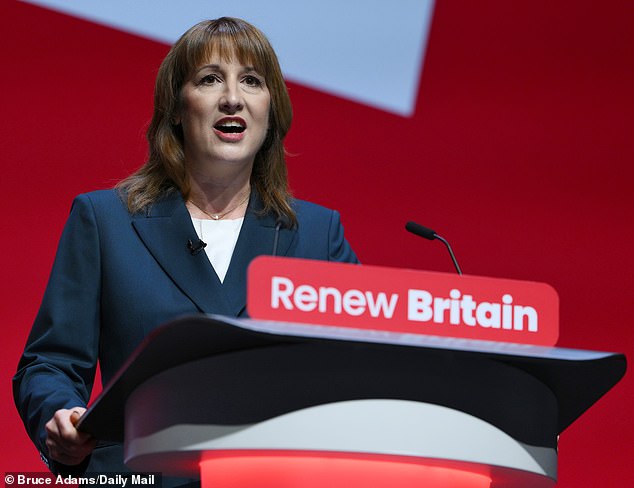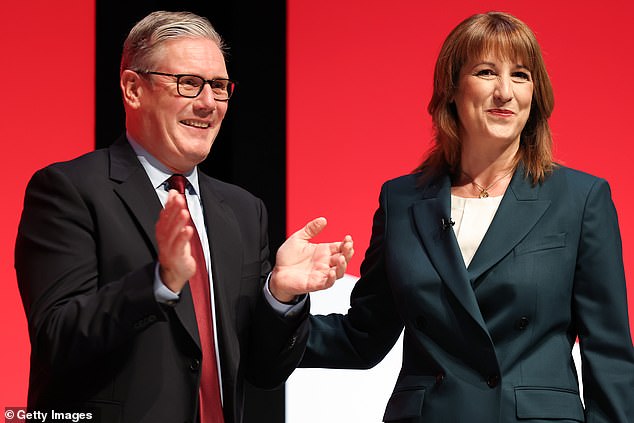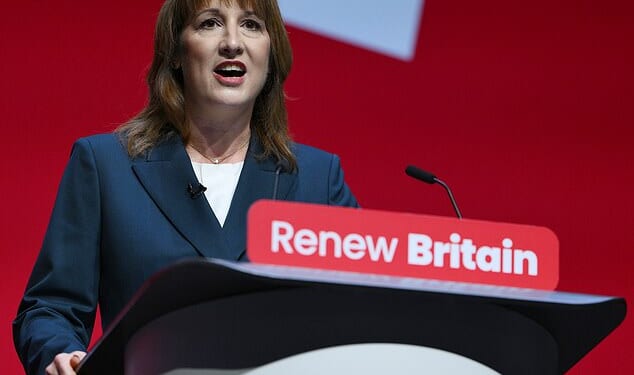Well, one thing is for sure. Spending money lavishly then clawing it back from the taxpayer is still the Labour way.
Anyone hoping for more details of the ‘hard choices’ that Rachel Reeves is weighing up on where to raise taxes, as she prepares for her grim second Budget in November, will have been disappointed by this thin and gloomy speech.
The Chancellor rattled off a list of spending commitments to please the Labour faithful –and, she all but added, hang the cost.
More breakfast clubs, a library in every primary school, a new employment scheme for young people and – of course – ever more funding for the NHS: all with no explanation as to where the money is supposed to come from.
Last year, after her £40billion tax-grabbing Budget, the Chancellor offered voters a solemn pledge that she would not be coming back for more. That promise is toast.
Yes, Reeves made a hollow vow that she would ‘stand up for British business’. But after last year’s debilitating hike to employers’ National Insurance (NI), the punishing rise in the living wage and the unlamented Angela Rayner‘s job-destroying Employment Rights Bill, it’s clear to anyone with eyes and a brain that Labour is doing precisely the opposite.
Instead, the Chancellor sang an endless refrain that she wants above all to help ‘working people’. That should be a wake-up call to what remains of British business, to better-off taxpayers, to homeowners and to anyone saving in a pension. Each of these groups, already taxed to the hilt, is clearly in the firing line come November 26.

Rachel Reeves made a hollow vow that she would ‘stand up for British business’. But after last year’s debilitating hike to employers’ NI, the rise in the living wage and the changes to the Employment Rights Bill, it’s clear that Labour is doing precisely the opposite
The only way that the self-styled ‘Iron Chancellor’ can meet her fiscal targets and her promise to lavish more state spending on one pet Labour project after another is by piling on new levies and charges so these pips squeak even more loudly.
Reeves, like so many on the Left, appears utterly incapable of understanding the economic and behavioural consequences of raising taxes again and again on business, savings and wealth.
History has repeatedly shown that, beyond a certain point, higher taxes crush aspiration, enterprise, growth and prosperity – and lead to consequences such as capital flight (when those who can move money abroad) or reduced consumption (just witness the near-freezing of the housing market amid worries about imminent fresh hikes to stamp duty).
And here’s the proof: receipts this year have been lower than expected despite the raft of new taxes piled on since last October.
Meanwhile, expenditure continues to rise. Between October last year and August this year, the Government borrowed almost £84billion – some £11billion more than forecast for just the first five months of this tax year. The Government ratio of debt to GDP now stands at 96 per cent – and heading by the day to the deeply symbolic 100 per cent.
Which brings me to a technical but crucial point. Later this week, the Chancellor will receive the first draft of new forecasts on British growth from the Office for Budget Responsibility (OBR).
This is the first time in 14 years that the OBR has updated its productivity forecasts – it is expected to say that British productivity is even weaker than we’ve previously been led to believe. That, in turn, will dictate the Government’s spending abilities – a higher productivity allows for more bouyant output and higher spending.
During the long years of the coalition and Tory rule, the watchdog sat on its hands as far as productivity forecasts went. Now the Chancellor’s allies are incandescent that just when the public finances are stretched to the limit, the OBR should have picked this very moment to suddenly land the Government with stringent new forecasts.
The widespread expectation is that this new OBR forecast will reveal a black hole in the Budget of up to £40billion – almost twice the inheritance Labour unconvincingly claimed to have been left by the Tories.

Much of the talk in the corridors of the Liverpool conference is whether Reeves will be given leave from Sir Keir Starmer to breach the manifesto promise of no rises in income tax, National Insurance or VAT
The Treasury is seeking to convince the budget watchdog that trade deals with India and the United States and its ‘jobs plan’ for young people will move the dial on productivity. That, as George Bush Sr once famously put it, is voodoo economics.
Much of the talk at the Liverpool conference is whether Reeves will be given leave from Starmer to breach the manifesto promise of no rises in income tax, NI or VAT.
Of these, VAT is seen as the softest target, with speculation that private health provision could be in for the same punishment as independent schools, to pay for a cut on energy bills.
Imposing VAT on private health would be an outrageously cynical act, allowing Reeves to claim that, technically, she is sticking to her promise not to increase the tax – because the sector is not currently subject to VAT at all.
If this latest assault on Middle Britain were attempted, it would make barely an inroad into bringing the nation’s current spending into balance. Worse still, it would pile an even greater burden on the NHS, where resident doctors, GPs and other employees are already demanding a bigger share of the national cake.
There is an argument that Britain’s debt problems are not as bad as France’s (with debt of 114 per cent) or Italy’s. The difference is that in France, Italy and Germany governments are seeking to end the economic lunacy of living beyond their means.
Yet in Labour’s Britain, even modest efforts to reduce spending – such as cutting the gargantuan welfare bill – is seen as a political impossibility.
Reeves is getting in her Budget excuses early, blaming international headwinds for her inevitable tax rises. She is not entirely wrong. Donald Trump’s tariffs are proving devastating to international commerce. Exuberance in markets and wildly overpriced shares, especially in tech, are sending investors into safe harbours such as gold, which hit yet another record high in latest trading.
But what’s clear is that Britain, with its vast interest bill on the national debt (now standing at £1 in every £10 spent by Whitehall) is ill-equipped to cope with a crash or a slump.
Britain is in the midst of a classic Labour stagflation ‘doom loop’ – lumbered with a government that appears to think bailouts for rich companies, such as Jaguar Land Rover, and subsidies for failing steel plants will deliver a revival. They could not be more wrong.
As Reeves was on her feet, one of the UK’s biggest corporations, AstraZeneca, was giving its own caustic verdict on this absymal socialist government by deciding to list its shares in New York. This shameful moment is a totemic illustration of the heavy cost of Labour’s contempt for British business – and offers a terrifying glimpse of the future.










